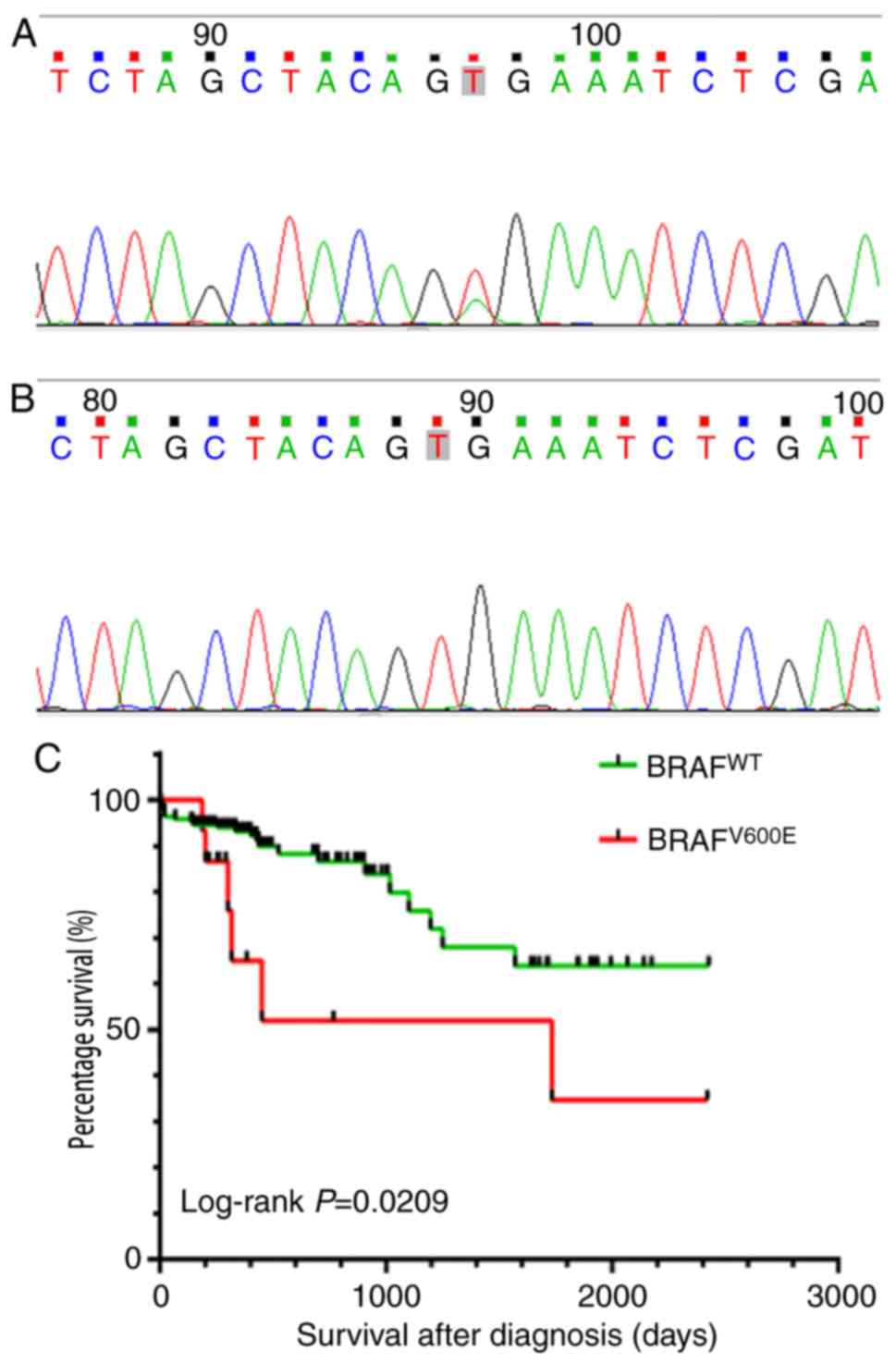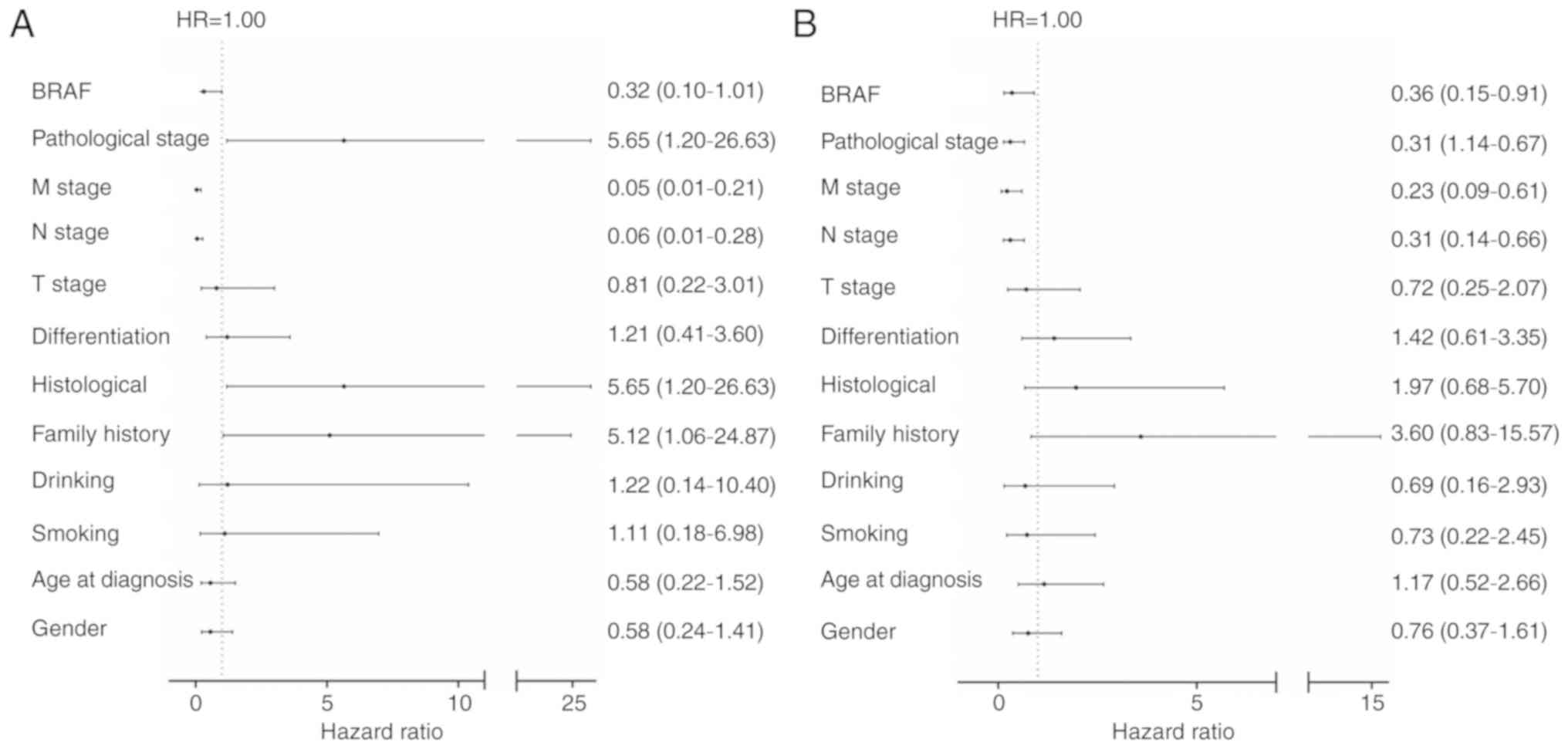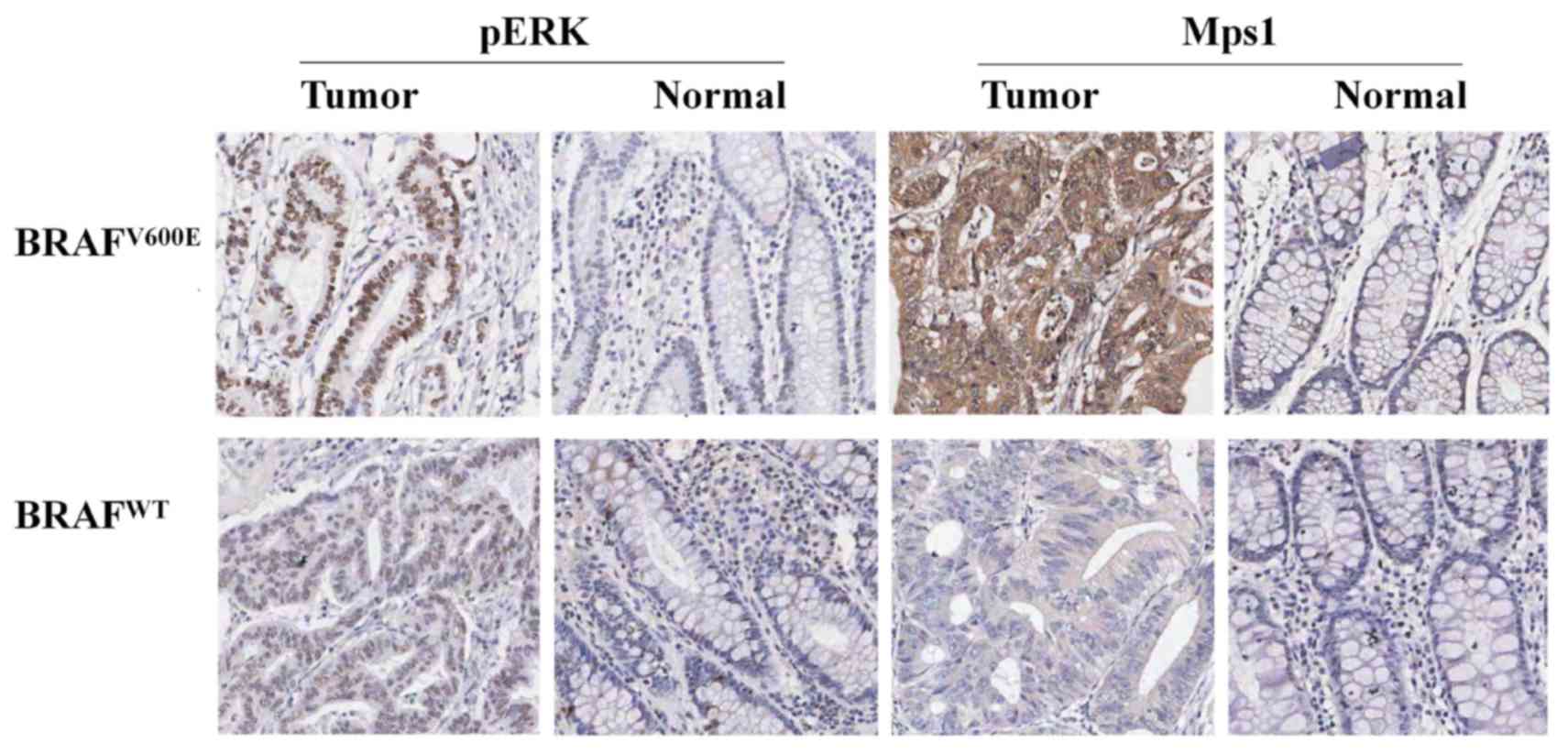|
1
|
Bray F, Ferlay J, Soerjomataram I, Siegel
RL, Torre LA and Jemal A: Global cancer statistics 2018: GLOBOCAN
estimates of incidence and mortality worldwide for 36 cancers in
185 countries. CA Cancer J Clin. 68:394–424. 2018. View Article : Google Scholar : PubMed/NCBI
|
|
2
|
Brenner H, Kloor M and Pox CP: Colorectal
cancer. Lancet. 383:1490–1502. 2014. View Article : Google Scholar : PubMed/NCBI
|
|
3
|
Stintzing S: Recent advances in
understanding colorectal cancer. F1000Res. 7:F1000 Faculty
Rev–1528. 2018. View Article : Google Scholar
|
|
4
|
Tímár J, Hegedüs B and Rásó E: KRAS
mutation testing of colorectal cancer for anti-EGFR therapy: Dogmas
versus evidence. Curr Cancer Drug Targets. 10:813–823. 2010.
View Article : Google Scholar : PubMed/NCBI
|
|
5
|
Prahallad A, Sun C, Huang S, Di
Nicolantonio F, Salazar R, Zecchin D, Beijersbergen RL, Bardelli A
and Bernards R: Unresponsiveness of colon cancer to BRAF(V600E)
inhibition through feedback activation of EGFR. Nature.
483:100–103. 2012. View Article : Google Scholar : PubMed/NCBI
|
|
6
|
Königsberg R, Hulla W, Klimpfinger M,
Reiner-Concin A, Steininger T, Büchler W, Terkola R and Dittrich C:
Clinical and economic aspects of KRAS mutational status as
predictor for epidermal growth factor receptor inhibitor therapy in
metastatic colorectal cancer patients. Oncology. 81:359–364. 2011.
View Article : Google Scholar : PubMed/NCBI
|
|
7
|
Davies H, Bignell GR, Cox C, Stephens P,
Edkins S, Clegg S, Teague J, Woffendin H, Garnett MJ, Bottomley W,
et al: Mutations of the BRAF gene in human cancer. Nature.
417:949–954. 2002. View Article : Google Scholar : PubMed/NCBI
|
|
8
|
Dizdar L, Werner TA, Drusenheimer JC,
Möhlendick B, Raba K, Boeck I, Anlauf M, Schott M, Göring W,
Esposito I, et al: BRAFV600E mutation: A promising target in
colorectal neuroendocrine carcinoma. Int J Cancer. 2018:
|
|
9
|
Kopetz S, Desai J, Chan E, Hecht JR,
O'Dwyer PJ, Maru D, Morris V, Janku F, Dasari A, Chung W, et al:
Phase II pilot study of vemurafenib in patients with metastatic
BRAF-mutated colorectal cancer. J Clin Oncol. 33:4032–4038. 2015.
View Article : Google Scholar : PubMed/NCBI
|
|
10
|
Su F, Viros A, Milagre C, Trunzer K,
Bollag G, Spleiss O, Reis-Filho JS, Kong X, Koya RC, Flaherty KT,
et al: RAS mutations in cutaneous squamous-cell carcinomas in
patients treated with BRAF inhibitors. N Engl J Med. 366:207–215.
2012. View Article : Google Scholar : PubMed/NCBI
|
|
11
|
Cui Y and Guadagno TM: B-Raf(V600E)
signaling deregulates the mitotic spindle checkpoint through
stabilizing Mps1 levels in melanoma cells. Oncogene. 27:3122–3133.
2008. View Article : Google Scholar : PubMed/NCBI
|
|
12
|
Cui Y, Borysova MK, Johnson JO and
Guadagno TM: Oncogenic B-Raf(V600E) induces spindle abnormalities,
supernumerary centrosomes, an aneuploidy in human melanocytic
cells. Cancer Res. 70:675–684. 2010. View Article : Google Scholar : PubMed/NCBI
|
|
13
|
Liu J, Cheng X, Zhang Y, Li S, Cui H,
Zhang L, Shi R, Zhao Z, He C, Wang C, et al: Phosphorylation of
Mps1 by BRAFV600E prevents Mps1 degradation and contributes to
chromosome instability in melanoma. Oncogene. 32:713–723. 2012.
View Article : Google Scholar : PubMed/NCBI
|
|
14
|
Zhang L, Shi R, He C, Cheng C, Song B, Cui
H, Zhang Y, Zhao Z, Bi Y, Yang X, et al: Oncogenic B-Raf(V600E)
abrogates the AKT/B-Raf/Mps1 interaction in melanoma cells. Cancer
Lett. 337:125–132. 2013. View Article : Google Scholar : PubMed/NCBI
|
|
15
|
NCCN Guidelines version 2.2015 Staging
Colon Cancer. https://www.nccn.org/professionals/physician_gls/default.aspx#site
|
|
16
|
Fu X, Huang Y, Fan X, Deng Y, Liu H, Zou
H, Wu P, Chen Z, Huang J, Wang J, et al: Demographic trends and
KRAS/BRAFV600E mutations in colorectal cancer patients
of South China: A single-site report. Int J Cancer. 2018 Nov
10;Doi: 10.1002/ijc.31973. View Article : Google Scholar
|
|
17
|
Sawada K, Nakamura Y, Yamanaka T, Kuboki
Y, Yamaguchi D, Yuki S, Yoshino T, Komatsu Y, Sakamoto N, Okamoto W
and Fujii S: Prognostic and predictive value of HER2 amplification
in patients with metastatic colorectal cancer. Clin Colorectal
Cancer. 17:198–205. 2018. View Article : Google Scholar : PubMed/NCBI
|
|
18
|
Bläker H, Alwers E, Arnold A, Herpel E,
Tagscherer KE, Roth W, Jansen L, Walter V, Kloor M, Chang-Claude J,
et al: The association between mutations in BRAF and colorectal
cancer-specific survival depends on microsatellite status and tumor
stage. Clin Gastroenterol Hepatol. S1542-3565(18)30371-9. 2018.
|
|
19
|
Tie J, Gibbs P, Lipton L, Christie M,
Jorissen RN, Burgess AW, Croxford M, Jones I, Langland R, Kosmider
S, et al: Optimizing targeted therapeutic development: Analysis of
a colorectal cancer patient population with the BRAF(V600E)
mutation. Int J Cancer. 128:2075–2084. 2011. View Article : Google Scholar : PubMed/NCBI
|
|
20
|
Pinheiro M, Ahlquist T, Danielsen SA, Lind
GE, Veiga I, Pinto C, Costa V, Afonso L, Sousa O, Fragoso M, et al:
Colorectal carcinomas with microsatellite instability display a
different pattern of target gene mutations according to large bowel
site of origin. BMC Cancer. 10:5872010. View Article : Google Scholar : PubMed/NCBI
|
|
21
|
Shaukat A, Arain M, Thaygarajan B, Bond JH
and Sawhney M: Is BRAF mutation associated with interval colorectal
cancers? Dig Dis Sci. 55:2352–2356. 2010. View Article : Google Scholar : PubMed/NCBI
|
|
22
|
Ogino S, Nosho K, Kirkner GJ, Kawasaki T,
Meyerhardt JA, Loda M, Giovannucci EL and Fuchs CS: CpG island
methylator phenotype, microsatellite instability, BRAF mutation and
clinical outcome in colon cancer. Gut. 58:90–96. 2009. View Article : Google Scholar : PubMed/NCBI
|
|
23
|
Rozek LS, Herron CM, Greenson JK, Moreno
V, Capella G, Rennert G and Gruber SB: Smoking, gender, and
ethnicity predict somatic BRAF mutations in colorectal cancer.
Cancer Epidemiol Biomarkers Prev. 19:838–843. 2010. View Article : Google Scholar : PubMed/NCBI
|
|
24
|
Fariña-Sarasqueta A, van Lijnschoten G,
Moerland E, Creemers GJ, Lemmens VE, Rutten HJ and van den Brule
AJ: The BRAFV600E mutation is an independent prognostic
factor for survival in stage II and stage III colon cancer
patients. Ann Oncol. 21:2396–2402. 2010. View Article : Google Scholar : PubMed/NCBI
|
|
25
|
Yoon HH, Shi Q, Alberts SR, Goldberg RM,
Thibodeau SN, Sargent DJ and Sinicrope FA; Alliance for Clinical
Trials in Oncology, : Racial differences in BRAF/KRAS mutation
rates and survival in stage III colon cancer patients. J Natl
Cancer Inst. 107:djv1862015. View Article : Google Scholar : PubMed/NCBI
|
|
26
|
Barras D, Missiaglia E, Wirapati P, Sieber
OM, Jorissen RN, Love C, Molloy PL, Jones IT, McLaughlin S, Gibbs
P, et al: BRAFV600E mutant colorectal cancer subtypes based on gene
expression. Clin Cancer Res. 23:104–115. 2017. View Article : Google Scholar : PubMed/NCBI
|
|
27
|
Bokemeyer C, Bondarenko I, Hartmann JT, de
Braud F, Schuch G, Zubel A, Celik I, Schlichting M and Koralewski
P: Efficacy according to biomarker status of cetuximab plus
FOLFOX-4 as first line treatment for metastatic colorectal cancer:
The OPUS study. Ann Oncol. 22:1535–1546. 2011. View Article : Google Scholar : PubMed/NCBI
|
|
28
|
Strub T, Ghiraldini FG, Carcamo S, Li M,
Wroblewska A, Singh R, Goldberg MS, Hasson D, Wang Z, Gallagher SJ,
et al: SIRT6 haploinsufficiency induces BRAFV600E
melanoma cell resistance to MAPK inhibitors via IGF signalling. Nat
Commun. 9:34402018. View Article : Google Scholar : PubMed/NCBI
|
|
29
|
Zhang G, Frederick DT, Wu L, Wei Z,
Krepler C, Srinivasan S, Chae YC, Xu X, Choi H, Dimwamwa E, et al:
Targeting mitochondrial biogenesis to overcome drug resistance to
MAPK inhibitors. J Clin Invest. 126:1834–1856. 2016. View Article : Google Scholar : PubMed/NCBI
|
|
30
|
Knauf JA, Luckett KA, Chen KY, Voza F,
Socci ND, Ghossein R and Fagin JA: Hgf/Met activation mediates
resistance to BRAF inhibition in murine anaplastic thyroid cancers.
J Clin Invest. 128:4086–4097. 2018. View Article : Google Scholar : PubMed/NCBI
|
|
31
|
Korphaisarn K and Kopetz S: BRAF-directed
therapy in metastatic colorectal cancer. Cancer J. 22:175–178.
2016. View Article : Google Scholar : PubMed/NCBI
|
|
32
|
Corcoran RB, Atreya CE, Falchook GS, Kwak
EL, Ryan DP, Bendell JC, Hamid O, Messersmith WA, Daud A, Kurzrock
R, et al: Combined BRAF and MEK inhibition with dabrafenib and
trametinib in BRAFV600-mutant colorectal cancer. J Clin Oncol.
33:4023–4031. 2015. View Article : Google Scholar : PubMed/NCBI
|
|
33
|
Kasbek C, Yang CH and Fisk HA: Mps1 as a
link between centrosomes and genomic instability. Environ Mol
Mutagen. 50:654–665. 2009. View Article : Google Scholar : PubMed/NCBI
|
|
34
|
Restuccia A, Yang F, Chen C, Lu L and Dai
W: Mps1 is SUMO-modified during the cell cycle. Oncotarget.
7:3158–3170. 2016. View Article : Google Scholar : PubMed/NCBI
|
|
35
|
Gorbsky GJ: The spindle checkpoint and
chromosome segregation in meiosis. FEBS J. 282:2471–2487. 2015.
View Article : Google Scholar : PubMed/NCBI
|
|
36
|
Edelmann MJ, Nicholson B and Kessler BM:
Pharmacological targets in the ubiquitin system offer new ways of
treating cancer, neurodegenerative disorders and infectious
diseases. Expert Rev Mol Med. 13:e352011. View Article : Google Scholar : PubMed/NCBI
|
|
37
|
Hiruma Y, Sacristan C, Pachis ST,
Adamopoulos A, Kuijt T, Ubbink M, von Castelmur E, Perrakis A and
Kops GJ: CELL DIVISION CYCLE. Competition between MPS1 and
microtubules at kinetochores regulates spindle checkpoint
signaling. Science. 348:1264–1267. 2015. View Article : Google Scholar : PubMed/NCBI
|
|
38
|
Daniel J, Coulter J, Woo JH, Wilsbach K
and Gabrielson E: High levels of the Mps1 checkpoint protein are
protective of aneuploidy in breast cancer cells. Proc Natl Acad Sci
USA. 108:5384–5389. 2011. View Article : Google Scholar : PubMed/NCBI
|
|
39
|
Shankavaram U, Maachani UB, Zhao S,
Camphausen K and Tandle A: Molecular profiling of MPS1 gene
silencing in U251 glioma cell line. Genom Data. 6:36–39. 2015.
View Article : Google Scholar : PubMed/NCBI
|
|
40
|
Ling Y, Zhang X, Bai Y, Li P, Wei C, Song
T, Zheng Z, Guan K, Zhang Y, Zhang B, et al: Overexpression of Mps1
in colon cancer cells attenuates the spindle assembly checkpoint
and increases aneuploidy. Biochem Biophys Res Commun.
450:1690–1695. 2014. View Article : Google Scholar : PubMed/NCBI
|
|
41
|
Dominguez-Brauer C, Thu KL, Mason JM,
Blaser H, Bray MR and Mak TW: Targeting mitosis in cancer: Emerging
strategies. Mol Cell. 60:524–536. 2015. View Article : Google Scholar : PubMed/NCBI
|
|
42
|
Martinez R, Blasina A, Hallin JF, Hu W,
Rymer I, Fan J, Hoffman RL, Murphy S, Marx M, Yanochko G, et al:
Mitotic checkpoint kinase Mps1 has a role in normal physiology
which impacts clinical utility. PLoS One. 10:e01386162015.
View Article : Google Scholar : PubMed/NCBI
|


















